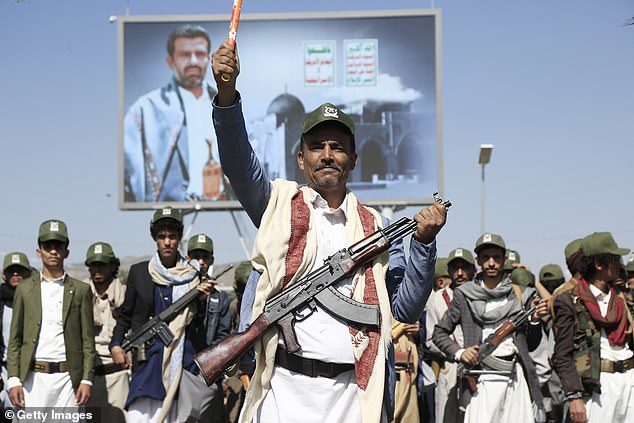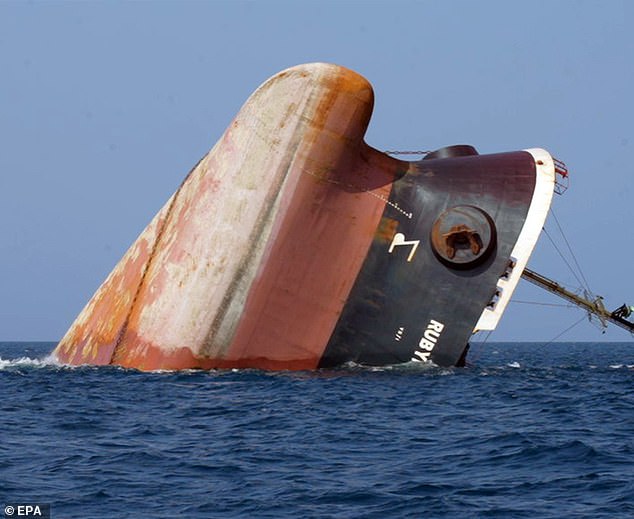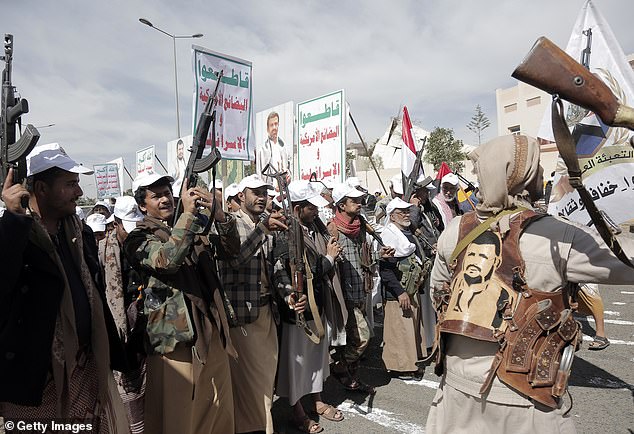Russia helped Yemeni Houthi rebels attack British and Western ships in the Red Sea, defence officials believe.
Houthi rebels reportedly benefitted from Russian satellite data, relayed through Iranian agents, to target trade vessels with missiles and drones earlier this month.
Information from Russia was passed on to members of Iran‘s Islamic Revolutionary Guards Corps (IRGC) embedded within the Houthi ranks, a source told the WSJ.
Citing a person ‘familiar with the matter’ and two European defence officials, the report suggests Russia has sought to intentionally destabilise the region to undermine Western economies reliant on trade via the Red Sea.
The Houthis have targeted more than 100 vessels since November in solidarity with Hamas over the ongoing war between Israel and Gaza.

The moment the Panama-flagged Cordelia Moon was engulfed in flames as a massive blast ripped through its port-side tank

The moment armed crewmembers tried desperately to gun the oncoming ship as it sped towards the Cordelia Moon

A trio of guards aboard the Cordelia Moon brandished assault rifles and let loose a volley of shots at the marine drone but were powerless to prevent it from ramming the vessel

Yemen’s Houthi movement supporters march in a parade in Sana’a on September 21, 2024

The oil tanker Cordelia Moon bursts into flames after being hit by a missile in the Red Sea, off Yemen’s Red Sea Port of Hodeida, in this screengrab from a video released on October 1, 2024
Russia and Iran have been nurturing closer military ties amid Russia’s war in Ukraine.
Tehran has allegedly transferred ballistic missiles to Moscow for use against Ukraine, the United States said last month.
One motivation for Moscow to arm the Houthis, well-placed sources told Reuters last month, is the possibility that Western states could decide to allow Ukraine to use their weapons to strike farther into Russian territory.
Security sources told Reuters that Iran had also brokered secret talks between Russia and the Houthis to transfer deadly anti-ship missiles that could be a ‘game changer’ for regional security and jeopardise British warships in the Gulf.
Western and regional sources with knowledge of the issue said at the time that Russia was yet to decide whether to send Yakhont missiles to the Houthis, which experts said would allow the militant group to more accurately strike commercial vessels and increase the threat to the U.S. and European warships defending them.
The Yakhont is considered one of the world’s most advanced anti-ship missiles, designed to skim the sea’s surface to avoid detection at more than twice the speed of sound, making it difficult to intercept.
The Wall Street Journal reported in July that Putin was considering sending the missiles to the Houthis, but Iran’s role as an intermediary.
Russia previously sent the missiles to Iran-backed Hezbollah in Lebanon, now at the centre of the regional conflict with Israel.
A senior U.S. official said that a delegation of U.S. officials discussed the Russia-Houthi negotiations with their Saudi counterparts during a visit to Saudi Arabia this summer, and that Washington has raised the issue with Moscow.
Two regional officials aware of the talks said that the Houthis and Russians met in Tehran at least twice this year and that the talks to provide dozens of the missiles, which have a range of about 186 miles, were ongoing with further Tehran meetings expected in coming weeks.
One of the sources said the talks started under Iranian President Ebrahim Raisi, who died in a helicopter crash in May.
‘Russia is negotiating with the Houthis for the transfer of Yakhont supersonic anti-ship missiles,’ said a Western intelligence source. ‘The Iranians are brokering the talks but do not want to have their signature over it.’
Neither Iran’s U.N. mission nor the Russian Defense Ministry responded to requests for comment.
‘We have no knowledge of what you have mentioned,’ said Mohamed Abdel-Salam, the official spokesman for Yemen’s Houthis.
Edmund Fitton-Brown, Senior Advisor to the Counter Extremism Project and former Ambassador of the UK to Yemen, told MailOnline that the claims were ‘very concerning if true’ and appear ‘credible’ so far as Iran and Russia are ‘locked in a rejectionist-disruptor embrace’.
‘One key Russian objective is to show US weakness and thus make Trump’s reelection more likely,’ he said. ‘That potential strategic gain overrides all other considerations.’
‘Any successful upgrade of Houthi capabilities would also likely draw a kinetic Israeli response,’ Mr Fitton-Brown warned, adding that such a deal could ‘draw clearer lines of alliances’ between an axis of Russia and Iran against the West.
‘Iran is often thought not to want to see Trump back in office. But it is shrewd enough to see the risk of Soleimani type operations being more than offset by the weakening of NATO.’
‘Russia could easily suffer losses from indiscriminate Houthi actions in the Red Sea. But it’s happy to run that risk for what it sees as bigger gains from stoking conflict.’

Smoke rising from the Sounion following Yemen’s Houthis attacks, in the Red Sea, August 29

The last part of the British-registered cargo vessel, Rubymar, sinking in the Red Sea off the coast of Yemen, March 3

A Houthi military helicopter flies over the Galaxy Leader cargo ship in the Red Sea in this photo released November 20, 2023

Yemeni tribesmen belonging to the Houthi movement participate in a popular parade and rally held to support Palestinians and against the US-UK aerial attacks on Yemen, on February 7

New Houthi recruits ride a vehicle during a parade against the United States and Israel, in Sana’a, Yemen, 07 February 2024
Rebels in Yemen have sunk at least two vessels and seized another, disrupting global maritime trade by forcing shipping firms to divert cargos and, according to industry sources, driven up insurance costs for ships plying the Red Sea.
Earlier this month, the Houthis hit a tanker previously owned by a British company with an explosive-laden drone, ripping a gaping hole in its side.
The Panama-flagged Cordelia Moon was shown engulfed in flames as it billowed thick black smoke into the sky.
Armed crewmembers were seen desperately trying to gun an oncoming ship as it sped towards the hull, but were powerless to prevent it from ramming the vessel.
Moments later a punishing explosion rang out and the tanker’s deck was clouded by smoke as sirens began to blare out.
The ship reported its crew were unharmed – but the captain of a nearby vessel told US Navy officials operating in the area that he heard four loud splashes at the time of the attack.
It is suspected these sounds were the impact of missiles missing the Cordelia Moon and landing in the sea.
In response to Houthi aggression, the United States and Britain have struck Houthi positions several times since January, but have failed to stop the group’s attacks.
In early August, following a Houthi attack on a container ship in the Red Sea, U.S. forces struck at Houthi targets in Yemen, including anti-ship cruise missiles.
But shipping through the Red Sea and Gulf of Aden has declined because of the threat.